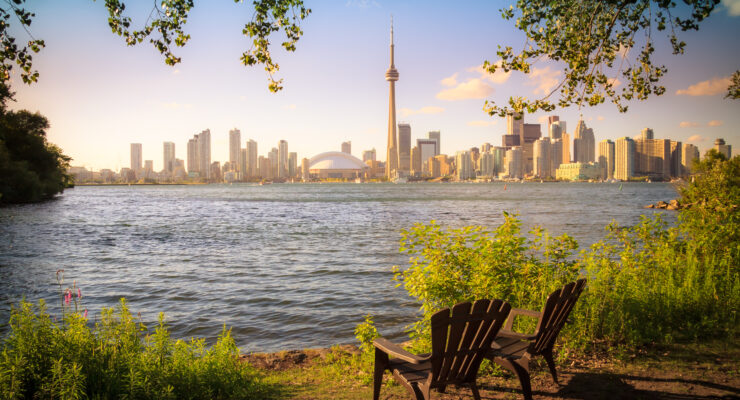Going to Canada on a Working Holiday, Young Professionals or International Co-op (Internship) permit? Congratulations, it’s going to be an amazing experience!
Now it’s time to prepare for your trip to Canada, and you have to make sure to comply with Canada’s latest travel rules and restrictions. Sounds overwhelming? Don’t worry, we have an easy-to-follow checklist just for you.
Step 1 – Buy your plane ticket
Pvtistes.net partners with a major airline… and you can enjoy a few perks as a member!
Air Transat and pvtistes.net has teamed up for a special offer applicable on flights to and from Canada / Europe —an extra 23 kg luggage allowance at no charge. Learn more about Air Transat’s special offer.
Air Canada offers preferential fares to travellers going to Canada from France (Metropolitan France, Guadeloupe and Martinique) to study or work temporarily, regardless of the work permit type. Two pieces of checked luggage are included and the tickets can be changed or cancelled. Learn more about Air Canada’s special offer.
IEC permit holders can buy a round trip or one-way ticket to Canada. If you do buy a one-way ticket, you will have to show proof of additional funds, i.e. enough money to buy your return ticket at the end of your stay.
Step 2 – Check if your passport is valid
Your passport must be valid for the entire duration of your stay. If it’s set to expire during your stay in Canada, you will be issued a shorter work or study permit. You’ll be able to extend it after renewing your passport but it’s best to avoid the unnecessary hassle and make sure you’re leaving home with a valid passport.
Read What do I do if I get a new passport after I apply for International Experience Canada? to learn what to do with your new updated passport information.
Step 3 – Don’t forget your port of entry (POE) letter
Bring your port of entry (POE) letter, which is the letter you received from IRCC stating that you’ve been approved for your work or study permit.
Don’t travel to Canada while your permit application is being processed or you may be refused entry. Wait until you receive your POE letter to travel.
If you are going to Canada as a tourist/visitor (for example, because you are accompanying your spouse who is going to Canada to study or work), you do not need a POE letter. Instead, you must apply for either a visa or an Electronic Travel Authorization (eTA), depending on your nationality. Check the Entry requirements by country or territory to know which applies to you.
Step 4 – Buy travel insurance coverage
IEC permit holders (Working Holiday, Young Professionals, International Co-op) must be able to show proof of health insurance coverage valid for the entire duration of their stay. If you only buy insurance coverage for a few months, you will be issued a shorter permit and you won’t be able to extend it after buying more coverage. See the following explanation from the government of Canada (source):
“If your insurance policy is valid for less than your expected stay, you will be issued a work permit that expires at the same time as your insurance. If this happens, you will not be able to apply to change the conditions of your work permit at a later date.”
We’ve been working with Globe WHV travel medical insurance since 2005 because this is one provider that offers great coverage at a competitive price. Plus:
- You can get a refund for any remaining months on your policy if you leave Canada early and permanently (a €30 application fee is required)—another reason to buy insurance coverage for the entire duration of your stay; you have nothing to lose!
- You can submit your medical claims online.
- They offer a flexible claims process—healthcare professionals can support your claim the way they prefer, with no need to fill out complicated forms.
- They can offer virtual medical consultations (with generalists and specialists).
Students or travellers who don’t have an IEC permit may want to check out insurance solutions from Globe Partner or Globe Traveller, depending on budget and needs.
Step 5 – Proof of sufficient funds
Depending on your permit and immigration status in Canada, you may have to prove that you have sufficient funds to cover your expenses.
IEC permit holders (Working Holiday, Young Professionals or International Co-op) must be able to prove that they have at least CA$2,500 in their bank account (or the equivalent amount in local currency). Your proof of funds can be a bank statement or a screenshot of your bank account. The statement or screenshot must be dated from within the last seven days and written in English or French (get a translation if required).
IEC permit holders going to Canada on a one-way ticket must show proof of additional funds to prove you can afford a ticket back home at the end of your stay. An amount equivalent to what you paid for your arrival ticket should do the trick.
Students need to show a larger amount in savings, depending on their province of arrival. If you participate in an unpaid internship in Canada, you need to have enough savings to support yourself during your entire stay (around CA$1,000 per month).
Step 6 – Other possible documents
Bring copies of all supporting documents provided in your application (such as police certificates) in case a border services officer asks to see them.
If you had a medical examination for your application, remember that you must arrive in Canada within the 12 months following your exam for the results to be valid. If you plan to arrive more than 12 months later, you will need to take another health examination and present the new results to the border services officer. Otherwise, it will be indicated on your work permit that you are not authorized to work in hospitals or with children.
If you did not have a health examination for your application but have changed your mind since then and would like to work in healthcare or with children, you should book an appointment (with an approved physician) before your departure to Canada and present the results upon arrival.
Step 7 – Housing for the start of your trip
To find housing for the start of your trip, you may consider a hotel, an Airbnb, or a youth hostel. Don’t forget Booking.com or Hostelworld. Hostelworld is especially good, as it allows you to chat with other travellers staying at your chosen hostel.
For more information on finding longer-term housing, read Finding accommodation in Canada.
Step 8 – Travelling with a partner or children
Working Holiday permit holder
The spouse or common-law partner of a Working Holiday permit holder can enter Canada with an eTA or a visitor visa, depending on their nationality. Check the Entry requirements by country or territory to know which one applies to you. Spouses and partners do not have work authorization in Canada.
Note that spouses or common-law partners of Working Holiday permit holders may be eligible to apply for an open work permit if the Working Holiday permit holder finds an eligible job.
Young Professional or student
The spouse or common-law partner of a Young Professional or student can enter Canada with an eTA or a visitor visa, depending on their nationality. Check the Entry requirements by country or territory to know which applies. Spouse/partners of certain study permit holders can apply for an open work permit online.
Travelling with children
Remember that children need their own eTA or visitor visa (depending on their nationality).
Grade 1 can start at 5 or 6 years old, so parents should check with their specific province or territory after they have settled in. Children who must attend school will be authorized to study without a study permit if they have a visitor record.
Step 9 – Cash, cards, and money transfers
You can consider mix of strategies:
- Bring your bank card(s) from home. With modern security features, credit or debit cards should work without risk of being blocked for use abroad.
- Bring some Canadian dollars in cash by visiting your bank or a currency exchange bureau. Alternatively, you could also just bring some cash in your home currency and then exchange it once in Canada. However, try to avoid unfavourable exchange rates at places catering to tourists, such as airports.
- Upon arrival (or even before, if you have already opened a Canadian bank account), you can consider sending a money transfer through Wise. Readers of pvtistes.net can get a first transfer with Wise without any fees.
Step 10 – Check out our Working Holiday in Canada resources
First, stay up to date with all things Canada on our website, using our dedicated destination Canada page and our useful tips and advice page.
Second, join us on Instagram, Tiktok (NEW), Facebook and our dedicated IEC forum.
Finally, download our super comprehensive and useful PDF guide, with 300 pages full of tips and advice to get ready for Canada. It has been downloaded (digital) or purchased (paper) by more than 150,000 of you! Get it now.
Mobile and Internet plans in Canada – Through pvtistes.net, you get
exclusive benefits with Fizz, including a $25 bonus, free mobile data, and one month of free Internet.
Step 11 – Improve your language skills in Canada
As Canada is a bilingual country, it might be important to improve your language skills (English, French, or something else!). Take a look at the following special offers:
Step 12 – Learn more about the job market in Canada
Most working holiday makers don’t have a job lined up in Canada, and that’s okay! Read Finding a job and working in Canada for more tips.
Take advantage of
special offers available to pvtistes.net readers, including deals for flights, phone plans, car rentals, international money transfers, hotels, and more.












 Français
Français English
English



